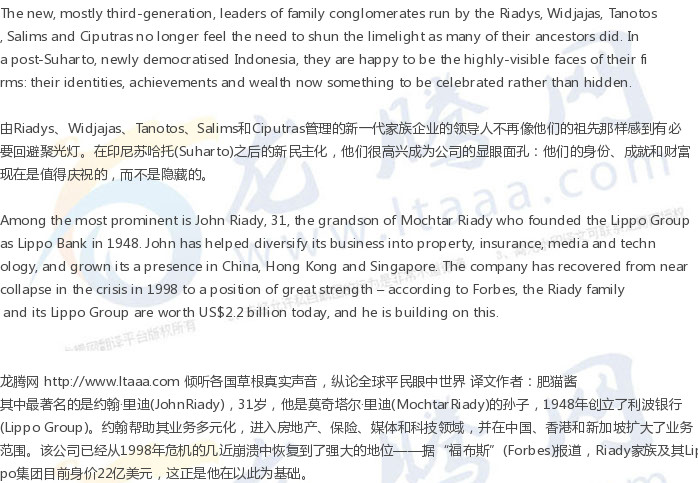为什么印尼华人不再低调了?? [美国媒体]
他们年轻而富有,是印度尼西亚一些最著名的商业王朝的后裔,他们并不怕展示它。自亚洲金融危机以来,最新一代的印尼华裔大亨们已经离黑暗岁月相去甚远。当时,他们的父母和祖父母不仅面临金融危机......
1998年雅加达发生冲突后,一名据称被警察射杀的男子被抬走。亚洲金融危机引发了一波暴乱和抗议,迫使苏哈托总统在32年统治后辞职。照片:美联社
They are young and rich, scions of some of Indonesia’s most prominent commercial dynasties. And they’re not afraid to show it.
他们年轻而富有,是印度尼西亚一些最着名的商业王朝的后裔,他们并不怕展示它。
The latest generation of Chinese-Indonesian tycoons have come far since the dark days of the Asian Financial Crisis, when their parents and grandparents faced not only financial ruin but the threat of violence and murder as they became scapegoats in a spiralling, racially-charged chaos that left their factories looted and burned.
自亚洲金融危机以来,最新一代的印尼华裔大亨们已经离黑暗岁月相去甚远。当时,他们的父母和祖父母不仅面临金融危机,还面临着暴力和谋杀的威胁,因为他们在一场剧烈的、带有种族色彩的混乱中成为替罪羊,导致他们的工厂遭到洗劫和焚烧。
So far is the reversal of fortune that today John, who is leading the company’s charge into e-commerce, talks of the progress the country has made in capitalising on its racial, religious and cultural diversities. He told This Week in Asia that today’s Indonesia was “inspiring in its ability to be welcoming to and absorbing of so many different diversities, and yet still preserve the core identity that holds us together ... this requires a unique combination of humility and confidence that few societies have”.
到目前为止,命运发生了逆转,如今,带领公司进军电子商务的约翰谈到了该国在利用其种族、宗教和文化多样性方面所取得的进展。他本周在亚洲表示,今天的印度尼西亚“在欢迎和吸收如此多不同的多样性方面表现出了令人振奋的能力”,但仍然保留着把我们团结在一起的核心身份…”。这需要谦卑和信心的独特结合,而这是少数社会所拥有的“。
James Riady pictured with his father, Mochtar, in 1994. Photo: AP
1994年,詹姆斯·里迪(JamesRiady)和他的父亲莫奇塔尔合影。图片:美联社
Taking a similar high profile is Fuganto Widjaja, 35, the grandson of Eka Tjipta Widjaja, who in 2001 lost his Bank International Indonesia business and defaulted on US$14 billion worth of debt.
35岁的富冈托Fuganto Widjaja也是Eka Tjipta Widjaja的孙子,他的银行在2001年失去了印度尼西亚的国际业务,并拖欠了价值140亿美元的债务。
All three are examples of how a new generation of Chinese Indonesian businessmen are coming out on the global stage, no longer afraid to declare their identities, achievements and wealth, according to Leo Suryadinata, a visiting senior fellow at ISEAS Yusof Ishak Institute who has authored several books on Chinese Indonesians,
伊塞亚斯-尤索菲沙克研究所访问曾写过几本关于印尼华人的书的高级研究员利奥-苏里亚迪纳塔(Leo Suryadinata),根据他的介绍,三个例子都说明了新一代印尼华人商人是如何登上全球舞台的,他们不再害怕公开自己的身份、成就和财富。
The 70 per cent claim had its roots in a 1968 talk in Tokyo by Suharto, according to Leo. It was rehashed in 1995 in a book by Australian analyst Michael Backman, who claimed Chinese Indonesians controlled 73 per cent of Indonesian-listed firms by market capitalisation, a statement debunked by other analysts.
狮子座称,这70%的主张源于1968年苏哈托(Suharto)在东京举行的一次会谈。澳大利亚分析师迈克尔·巴克曼(MichaelBackman)在1995年的一本书中对此进行了重新审视,他声称,印尼华人以市值计算控制了73%的印尼上市公司,这份声明遭到了其他分析师的驳斥。
Discrimination against Chinese began early in Indonesia’s history, and harks back to Dutch rule in the 1700s. More recently, under Indonesia’s first president, Sukarno, many Chinese Indonesians were killed during an anti-communist purge in 1965.
对华人的歧视始于印尼历史的早期,可以追溯到18世纪的荷兰统治时期。最近,在印尼第一任总统苏加诺(Sukarno)的领导下,许多印尼华人在1965年的反G清洗中丧生。
Under Indonesia’s first president, Sukarno, many Chinese Indonesians were killed during an anti-communist purge in 1965. File Photo
在印尼第一任总统苏加诺(Sukarno)的领导下,许多印尼华人在1965年的反GC主义清洗中丧生。档案照片
When Suharto took over the presidency a year later, he enforced more discrimination by banning the teaching of the Chinese language and celebrations of Chinese festivals, and pressured Chinese Indonesians to adopt Indonesian names.
一年后苏哈托就任总统时,他通过禁止教授汉语和庆祝中国节日来加强歧视,并迫使印尼华人使用印尼名字。
But he is not the first Chinese Indonesian in a prominent political role. In 1999, economist Kwik Gian Gie was named the economics and finance minister and later put in charge of the national development planning portfolio. In 2004, another economist, Mari Pangestu, became the first Chinese Indonesian female minister when she was given the portfolio for trade.
但他并不是第一个担任突出政治角色的印尼华人。1999年,经济学家Kwik Gian gie被任命为经济和财政部长,后来被任命为国家发展规划部门的负责人。2004年,另一位经济学家Mari Pangestu获得贸易投资组合后,成为第一位华裔印尼女部长。
This does not mean no one in the community is eyeing the country’s top political offices.
这并不意味着政党(政党中的华裔)没有人关注这个国家的最高政治职位。
Jakarta's governor Basuki Tjahaja Purnama, right, with Indonesian President Joko Widodo. Photo: AFP
雅加达的省长Basuki Tjahaja Purnama,右,和印度尼西亚总统佐科·维多多。图片:法新社
Of all these developments, Aimee Dawis, 38, author of The Chinese of Indonesia and Their Search for Identity, says one has been overlooked – the rise of influential, rich female Chinese Indonesians in business.
在所有这些发展中,38岁的艾梅·达维斯(Aimee Dawis)《印度尼西亚华人及其身份调查》的作者指出一个被忽视了——有影响力、富有的印尼华裔女商人在商界的崛起。
Among them are former judge Khartini Muljadi, an 86-year-old ranked 38th richest Indonesian who built up a pharmaceutical empire and advised the government, and Hartati Murdaya, 69, a real estate tycoon who owns malls, office buildings and the Jakarta International Expo Centre. The latter, widely-regarded as a financier of former president Susilo Bambang Yudhoyono, was convicted of graft in 2012.
其中包括86岁的前法官哈蒂尼·穆尔贾迪,他是印尼排名第38位的顶级富豪,他建立了一个制药帝国并为政府提供咨询。69岁的哈塔蒂·默达亚(Hartati Murdaya)是一位房地产大亨,拥有购物中心、办公楼和雅加达国际博览中心。后者被广泛认为是前总统苏西洛·班邦·尤多约诺(Susilo Bambang Yudhoyono)的金融家,2012年被判犯有贪污罪。
“Some of these females have been quietly building up their own business empires over decades as the spotlight turns on their male counterparts,” said Dawis.
达维斯说:“几十年来,随着人们对男性同行的关注,这些女性中的一些人一直在悄悄地建立自己的商业帝国。”
“The new generation of Chinese business leaders in their 30s and 40s have developed a unique identity which is not connected to a mythic homeland,” added Dawis. “[They] are busy building up the legacy they inherited.”
“新一代三四十岁的华人商界领袖形成了一种独特的身份,与神话般的祖国没有联系,”道维斯补充道。“(他们)正忙于积累他们继承下来的遗产。”
版权声明
我们致力于传递世界各地老百姓最真实、最直接、最详尽的对中国的看法
【版权与免责声明】如发现内容存在版权问题,烦请提供相关信息发邮件,
我们将及时沟通与处理。本站内容除非来源注明五毛网,否则均为网友转载,涉及言论、版权与本站无关。
本文仅代表作者观点,不代表本站立场。
本文来自网络,如有侵权及时联系本网站。
图文文章RECOMMEND
热门文章HOT NEWS
-
1
Why do most people who have a positive view of China have been to ...
- 2
- 3
- 4
- 5
- 6
- 7
- 8
- 9
- 10
推荐文章HOT NEWS
-
1
Why do most people who have a positive view of China have been to ...
- 2
- 3
- 4
- 5
- 6
- 7
- 8
- 9
- 10


















